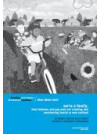Lesbians and gay men can face significant challenges as they seek to create and maintain families that include children but in most cases they overcome these challenges with considerable success, new research funded by the Families Commission has found.
The paper “We’re a family”: A study of how lesbians and gay men are creating and maintaining family in New Zealand by Alexandra Gunn and Nicola Surtees from the University of Canterbury, was supported by the Commission’s “Blue Skies” research grant scheme. Twenty interviews were conducted with parents from 19 families. The majority of interviews were with lesbian mothers either parenting as single women or as couples. Two of these couples were also parenting with single gay men. One interview was with a gay male couple.
The authors found that there were different challenges facing gay and lesbian parents depending upon whether they were using assisted reproduction, or whether they were bringing children into a family from a previous heterosexual relationship.
Purpose
This project explores the ways lesbians and gay men create and maintain family in contemporary New Zealand society. Its purpose was to illuminate successes and challenges experienced by lesbians and gay men as they created and maintained families together.
Methodology
This project is a small-scale qualitative interview study seeking to explore non-traditional family life in contemporary New Zealand society, with a particular focus on families where lesbians and gay men parent dependent children. The study aims to investigate how families are created, and how they are maintained. It explores ways to build on identified successes while addressing challenges and emerging issues in these processes. The report will discuss related social and policy implications.
The research questions were:
> In what ways are lesbians and gay men ‘creating families’?
> What does life within these families look like?
> What successes, challenges and issues do these families experience?
> What supports parenting in these families?
> What is needed to support parenting in these families?
The methodological orientation of this project is qualitative and interpretive. Qualitative research demands the gathering of extensive data rich in detail that enables in-depth study (Bogdan & Biklen, 1998; Patton, 2002). Interpretative analysis, filtered through subjective experience, makes the world visible in different ways to different observers (Denzin & Lincoln, 2000), at the same time as striving to make sense of social life and the ways people make meaning (Neuman, 1997). The open-ended, semi-structured interview is considered an appropriate tool to achieve these ends. Typically, in reading data from such interviews, the researcher is able to identify and explore sequential themes, pose contextually relevant questions in order to develop deep understandings and engage in flexible and reflective processes (Bogdan & Biklen, 1998; Gillham, 2000; Opie, 2003; Patton, 2002). In the case of this study, the data readings enabled exploration of several related themes that highlighted the ways the parents made meaning about their families: how families came into being, how they were being maintained and associated significant successes and challenges.
Key Results
The first conclusion drawn from this study is highlighted through the ways in which some families’ actively portray themselves in ways that positively publicise family diversity. There is much to be learnt from their recognition and valuing of non-traditional modes of family life. Not only may this help counteract the discriminatory effects of heteronormativity, it also broadens perceptions about who and how families can be in contemporary New Zealand society.
The second conclusion drawn from this study suggests it is prudent to revisit the legal structures that currently prevent the recognition of multiple parents in planned multi-parenting families, with respect to legal parenthood, birth registration and additional guardianship. In these families, not only does at least one parent have to miss out when the process only allows for recognition of two parents on the birth register and certificate, the children too may be denied access to all their parents. Further, these children are denied having their parentage recorded with accuracy and respect. Progressive and positive law change, with respect to parenting and relationships recognition, is a hallmark of New Zealand legal history in the early part of the 21st century. It will be a further step towards inclusive policy if provisions are extended to catch up with the realities of multi-parenting family models.

